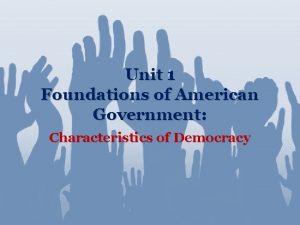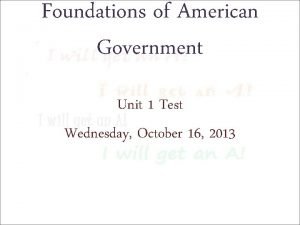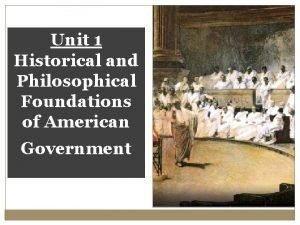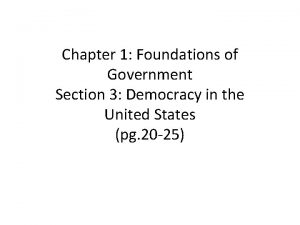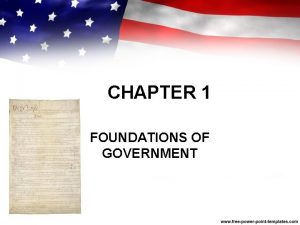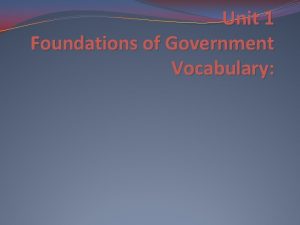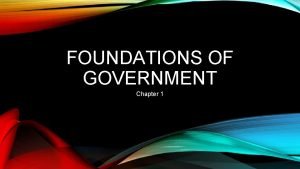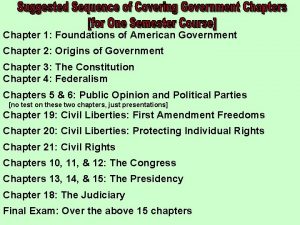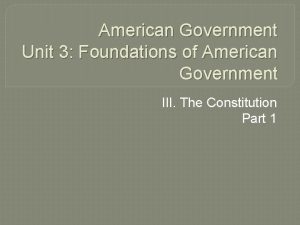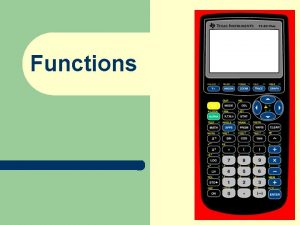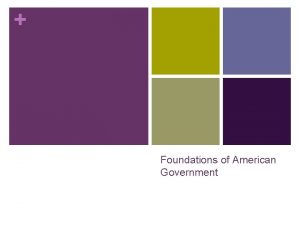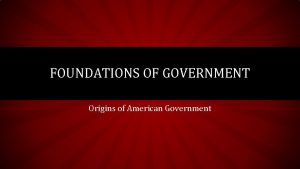Foundations of American Government The Functions of Government













- Slides: 13

Foundations of American Government

The Functions of Government is an institution in which leaders use power to make and enforce laws. Governments set priorities and make decisions, and they maintain order by enforcing laws; without government there would be anarchy (no laws/rules) Governments provide public services and promote public health and safety. Governments provide national security to protect the people against external threats. Governments protect the economic security of their people and may provide assistance to those in need.

Nation, State, and Country A nation is a large group of people united by common bonds of race, language, custom, or religion. A state and a country are both political communities that occupy a definite territory and have an organized government. A state has sovereignty, which means that its government makes and enforces its own laws. States in today’s political world share four essential features: population, territory, sovereignty, and government. Sovereignty – supreme and absolute authority within territorial boundaries

Origins of the State Evolutionary theory suggests that the idea of state evolved from the structure of ancient family groups. According to force theory, states emerged when people needed to cooperate to survive and one person or a group took control. The divine right theory refers to European rulers who proclaimed that their right to rule came from God alone. Thomas Hobbes developed the social contract theory, in which people gave up their freedom to the state in return for order and security (agreement amongst people).

Systems of Government A unitary system of government gives all key powers to the central government, which gives some powers to state and local governments. A confederacy, or confederate system of government, is a loose union of independent and fairly sovereign states. A federal system of government divides the powers of government between the national and state or provincial government, with each level having sovereignty in some areas.

Constitutional Governments A constitution is a plan that identifies the people’s ideals; establishes government structure, powers, and duties; and provides the supreme law. A constitutional government is limited because the constitution places limits on the powers of government officials. No written constitution can spell out all the laws, customs, and ideas that evolve around it. Governments do not always follow the laws of their constitutions.

Major Types of Government Authoritarian governments, or totalitarian states, control all aspects of citizens’ economic, political, and social lives. Monarchy is a form of government in which one person—a king, queen, or emperor—inherits the throne and heads the state. A democracy is a system of government in which the people rule, either directly or through representatives. In an indirect or representative democracy, the people elect representatives and give them the power to make laws and conduct government. Republic - government in which voters hold sovereign power, , elected representatives, responsible to the people, exercise that power

Principles of Democracy Principles which guide a democracy include citizen participation, regular free and fair elections, rule of law, and majority rule with minority rights. Accountability, transparency, limited government with a list of citizens’ rights and freedoms, control of the abuse of power, and economic freedom are also key principles. Further principles include equality for all individuals, respect for individual or human rights, an independent judiciary, and competing political parties

Fundamentals of Economics is the study of how people and nations use their limited resources to try to satisfy wants and needs. Governments play key roles in economies, and every economy has producers, distributors, consumers, labor, resources, and capital. Economic systems are classified either by how the economies work or by the political ideology that is connected to the economy.

Capitalism is an economic system that emphasizes private ownership of the factors of production, freedom of choice and individual incentives. The goal of capitalism is to create a free market where buyers and sellers are free to make their economic decisions. Competition plays a key role in capitalism because sellers compete over resources to produce goods and services at the best price. Pure capitalism has five characteristics: private ownership and control of property and economic resources, free enterprise, competition, freedom of choice, and the possibility of profits.

Mixed Economies Mixed economies combine elements of capitalism and socialism (United States, Mexico) Government regulates private enterprise Sometimes, a country can shift from one type of economy to another. The economic system of the United States has shifted as the federal government has grown, has become more involved in regulating industries, and has created programs to provide basic economic security.

Socialism is an economic system in which government owns the basic means of production, determines the use of resources, distributes products and wages, and provides social services for its people (health care and welfare). Democratic socialists believe in political democracy but want government to regulate the distribution of wealth. Under democratic socialism, citizens have basic democratic rights, but the government makes economic decisions and may own key industries.

Communism, a Command Economy Communism is an economic system in which the central government directs all major economic decisions. Government decides how much to produce, what to produce, and how to distribute goods and services. A communist system is called a command economy because government makes the decisions for the nation. In a purely communist country, there is no private property— the state owns the land, natural resources, industry, banks, and transportation facilities and also controls mass communication. Most communist nations vary in how much of the economy is state-controlled, and the government’s role in the economy can change over time.
 Unit 1 foundations of american government
Unit 1 foundations of american government Foundations of american government unit test
Foundations of american government unit test Philosophical foundations of the american revolution
Philosophical foundations of the american revolution Encounters and foundations to 1800 comprehension answers
Encounters and foundations to 1800 comprehension answers Chapter 4 foundations background to american history
Chapter 4 foundations background to american history Foundations of government section 3
Foundations of government section 3 Lesson 1 purposes and origins of government
Lesson 1 purposes and origins of government Foundations of government vocabulary
Foundations of government vocabulary Chapter 1: foundations of government pdf
Chapter 1: foundations of government pdf Foundations of government (chapter 1 test form a)
Foundations of government (chapter 1 test form a) Hình ảnh bộ gõ cơ thể búng tay
Hình ảnh bộ gõ cơ thể búng tay Lp html
Lp html Bổ thể
Bổ thể Tỉ lệ cơ thể trẻ em
Tỉ lệ cơ thể trẻ em
